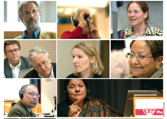Skat was mandated to conduct an external evaluation of the network Medicus Mundi Switzerland. The objective of the evaluation was to assess the results of the network Medicus Mundi Switzerland with regards to addressing the challenges faced by the global and international health sector.
Country:
Switzerland
Project Period:
2013
Name of Client:
Medicus Mundi Switzerland
Description of the Project:
Medicus Mundi Switzerland – Network Health for All is the network of Swiss organisations working in the field of international health. It promotes the sharing of knowledge and know-how among its members and partners. A total of 45 organisations and around 200 individuals are members of the Network. The network MMS was established in 1978 as an Association and is led by a Steering Committee composed by eight members. Its purpose is to improve the health of disadvantaged populations and its vision is to ensure Health for All. The main contribution of the Network is to improve the quality, visibility and impact of the Swiss organisations working in the field of International Health Cooperation. It also fosters the promotion of members’ activities within a wider community, including the exchange with Medicus Mundi International (MMI) and with other Swiss and international organisations and networks active in the International (Health) Cooperation. The Swiss Agency for Development and Cooperation supports the activities of MMS since 1979.
As in many Networks, MMS is a knowledge network with a small Secretariat but perceives the enthusiasm and commitment of its members. The Network is able to achieve important results such as promoting the knowledge sharing and exchange among members and becoming the voice of the Swiss Civil Society in terms of international health cooperation.
The evaluation took place between March and April 2013. The method for data collection was primarily qualitative, including documents published by the network and interviews with network members and key stakeholders.




